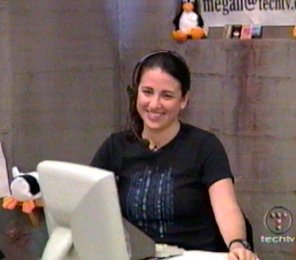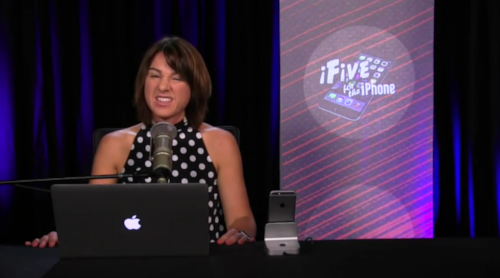It was a simpler time. Before Facebook. Before the iPhone. Most desktop PCs still ran Windows 98, and people rarely sent me messages telling me how ugly I was.
I’m talking about the year 2001 when I played one of the side-kicks and occasional fill-in co-hosts on a cable TV network called TechTV. If you lived in San Francisco at the turn of the millennium, you might remember that the network started as ZDTV from Ziff-Davis, a well known tech publisher. Execs at the fledgling network covered the city with billboards advertising a cable TV station that most people living in San Francisco could not get as part of their package. At the time, when I told people about my job, they’d never seen the show, but they remembered the billboards. The network changed its name to TechTV. Later Comcast bought it, renamed it G4TV and moved the operation to LA, where it morphed into a station that most people remember (if you remember it at all) for its video game coverage and shows featuring women in bikinis jumping on trampolines. But I was long gone by then.
LIVE FROM THE TECHTV STUDIOS, IT’S THE SCREEN SAVERS
Before the women in bikinis on trampolines, there was the 90-minute live cable television show called The Screen Savers, a Car Talk-like program that featured the lovable duo of Leo Laporte and Patrick Norton, who would offer tech tips and take your computer questions. I was part of a supporting trio that in the beginning included the irreverent and whip-smart Martin Sargent—who is funnier than Jimmy Kimmel and Jimmy Fallon combined, and deserves his own late night show. My partner in crime at the start was the gracious and kind-hearted Jessica Corbin, fresh out of UCLA and so much more comfortable on camera than I was. Jessica’s red hair combined with my dark hair caused many to call us the Ginger and Mary-Ann of tech. Jessica never wore sequined dresses, and I never wore crop-tops or gingham; but I did have an excellent collection of geeky t-shirts, which I wore every day because we had no wardrobe department, and because people sent me the t-shirts for free.
The Screen Savers was a variety show where things often went terribly wrong, and I always believed that’s what made us so endearing. We weren’t slick or over-produced. Many of us had no television training. We could wear funny costumes to prove a point about overclocking, and when our technology wouldn’t work, we took a sledgehammer to it or threw it off a cliff.
THE END OF THE MONOCULTURE
The Screen Savers came on the air just at the tail-end of what some call the monoculture—those decades of Must See TV, where everyone watched the same things and talked about them the next morning at work and school. Everyone did not watch The Screen Savers. But many people did, and I still hear from former fans with fond memories of watching the show with their family or even growing up with it. This was before Reddit or dating apps, in a time when all of us felt a lot more alone in our idiosyncrasies. We couldn’t just hop online with the promise of finding someone who was interested in whatever niche thing we were interested in. Our audience was mostly male, but I heard from girls and women, too. I continue to hear from people who—at the time they watched us on television, thought they were the only person in the world who even knew what Linux was—were shocked to find that they were not the only person to be entertained by watching someone install it on live television.

My email address was posted above my desk on the set, and I encouraged people, as I still do, to send me messages. Viewers offered additional answers to questions, provided further resources and often just emailed to say hi. I received compliments on my work and my appearance. I even received a few marriage proposals, despite the fact that I was already married and also believed it to be unwise to marry a complete stranger. I was 27-years-old, and every day before the show a professional did my hair and make-up. I was still me, but a slightly improved version of me. And beyond everything else I was approachable, something the monoculture rarely showed us. Mary Tyler Moore was approachable. Mary Ann on Gilligan’s Island was approachable. But they were reading lines that someone else wrote for them and rarely did their computer show a blue screen of death during a live demo of a Windows Tip. Ours was a reality show, without the slick editing of MTV’s Real World.
MEAN TWEETS
Before I started back at TWiT in January of 2015, our CEO, Lisa, warned me that things were rough out there on the Internet. For the previous decade, while my Wikipedia page mysteriously stayed online, I had enjoyed relative anonymity. I had a Twitter account, but I never tweeted. I wasn’t on Facebook. I had only recently signed up for a private Instagram account so I could follow my daughter. I remember having drinks with a friend who worked at TWiT, before I started back there. She had to tell me what Gamer Gate was because I’d never heard of it. And she pondered why someone would ever want to have a private Instagram account, and I wondered why anyone would want a public one.
Work I had done in the past was still on the Internet, and even in my real life I would occasionally run into people who had watched The Screen Savers. Fans had uploaded old episodes of The Screen Savers to YouTube, and if anyone ever mentioned me in comments, it was always with some form of, “What ever happened to her?” My defunct mommy blog survived, but only because I didn’t have the heart to take it down (much to my children’s chagrin). The only people who visited the page seemed to be my kids Googling themselves or some snake oil salesmen promising that they could improve my SEO for a very low fee! I’d been working as a freelancer for Microsoft for a decade, but all my work had been published without my byline. I enjoyed being invisible. I remember telling Lisa that I had a pretty thick skin and saying that I thought any kind of attention, negative or positive, was proof that you were making a difference in the world. That was my version of “I don’t care what the newspapers say about me, as long as they spell my name right.”
I was pretty nervous going back on air, and I kept reminding myself that the feedback I had always gotten when I was on The Screen Savers was that people liked me because I was me. I wasn’t trying to be anyone else. I was approachable and also authentic. I wasn’t making any particular effort to be authentic, I just wasn’t an actor. The only person I could play on TV was me.

It’s safe to say now that I hadn’t quite prepared myself for the difference between 2003 and 2015. First, I was no longer 27. I was 41. Also, I was no longer the sidekick. I was the solo host of two shows and eventually Leo’s co-host on a third.
I began to get emails about my appearance pretty much right away. People felt that it was their responsibility to inform me that I was ugly, my eyebrows needed more grooming, my nose was too big, I shouldn’t wear polka dots, I was not good at my job, and I most definitely talked about my kids too much. I have always been my sharpest critic, but not anymore. Sometimes these messages seemed like a direct manifestation of the harshest voices in my head. I got nice emails too, words of encouragement and tips on talking slower and maybe taking a breath once in a while. I got nice tweets too, although many of them were not so nice. I tried retweeting or responding with humor, but that often made things worse. “Don’t feed the trolls,” well-meaning onlookers would chasten, but sometimes that made me feel like they’d won. People made fake accounts in my name and managed to fool many of my colleagues. The trolls danced precariously around libel and slander. These people knew what they were doing.
I am not asking for sympathy. I understand that this comes with the territory of putting yourself out there. But for someone who had experienced so much gracious community on The Screen Savers nearly a decade and a half earlier, it was a shock. People I’d worked with in the past had had time to adjust to what it was like to be publicly online in 2001 compared to what it was like in 2015. I wasn’t that hypothetical frog in slowly boiling water getting used to online feedback. I was a kitten thrown into a cold bath of ice. It caused me to ask myself if the Internet had gotten meaner or had I just gotten older? Was I hearing the death knell of civil online discourse, or do most people simply find it distasteful to see an average-looking women on a screen after they hit 30?
I think it’s a bit of both.
I WILL NEVER KNOW
People are nicer now. Have I grown on them? Has my lack of response bored the mean tweeters and caused them to go elsewhere? Maybe the most important thing I’ve learned in these two years I’ve been back is that I will never know. These angry online folk don’t really know me, and I don’t know them either. These days I’m more quizzical about why they choose me over a real celebrity. And I’ve come to understand that there are people out there who might have had lives so difficult that they cry out for attention by attacking the eyebrows of a 43-year-old woman on a tech podcast. And some people are just sociopaths. And it is not my job to judge which is which. And maybe technology has enabled people to be a little meaner on the Internet, or maybe its enabled me to see more of the meanness. What I know for sure is that I am older. And if I think of that only as the lines I see on my face in 2017 that weren’t there in 2001, then I’m playing the same game as the online trolls. Because what I hope is that being older means I have a better understanding of people and more empathy for others as well as for myself. And that spending time wondering about the motivations of an online stranger is not the way I want to spend my days.
I do my best not to respond to people who comment on my appearance, positive or negative. But if someone takes issue with something I’ve said, I do try to reply, no matter how angrily they’ve phrased their comment. And more often than not, I receive a response back, and even an apology, that makes me know that they’ve reread what they’ve written with a renewed understanding that a real person is on the other end reading it.
I loved reading this!! Great writing. It’s so weird to think about what someone’s motivations might be to insult you, or any stranger’s appearance via email – some version of terretts.
LikeLike